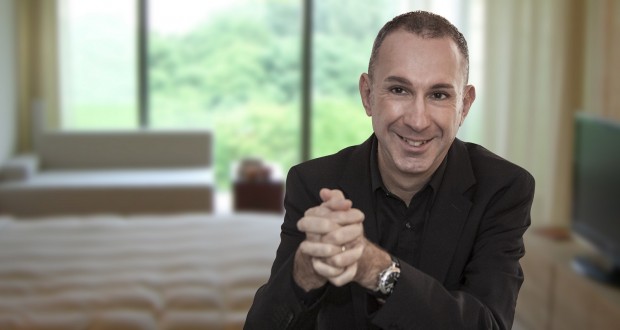The LEAP laboratory conducted an interview with the writer Bruno Marion about his latest book, « Chaos, a User’s Guide ».
In what context have you written this book?
Humanity is currently experiencing an absolutely incredible transition because of its size and speed. It is high time we design tools to help us to better understand and act in this world, which I personally describe as chaotic. My mission with this book is therefore to contribute positively to this transition, to make sure this transition happens as smoothly as possible for the maximum number of people and to make sure it brings us all towards a better future – even if I do not know exactly what “a better future” means!
At present, you are a coach as well as a consultant to companies. Could you give us a quick description of your journey and your current situation?
I am an engineer by training. But ever since I was a little boy, I have been trying to understand the world I live in. I thought that by becoming an engineer I was going to understand everything: the way the world worked, the mechanics and other similar stuff; but I soon realized that this was not the case. I then wanted to understand the business world and so I did an MBA, but it did not help me much more. So, I thought I had to travel and see what was happening on the other side of the world and this helped me a little bit. I worked in large companies. The more I progressed, the more I learned things, but it still did not give me the answers I was looking for. I finally left the corporate world … and decided to accompany them in a different way: I am now offering them my tools to help them understand this increasingly chaotic world. I do this both through my conferences and several types of accompaniments which we might very well call “strategic”; something you would most probably call “coaching”.
What do you mean when you say that the world has become chaotic?
We are talking about a chaotic system. A system is a set of things, and a chaotic system has a number of properties. Chaos is neither good nor bad. Just as water can have several states (solid, vapour, liquid), a system, an enterprise and humanity can have several states: stable, oscillating (we speak of a cyclic crisis for example) and finally chaotic. Today, from my point of view, and from the point of view of the observations I make while travelling around the world every year, and through the encounters I make, the world has become chaotic scientifically speaking. This is happening for three reasons mainly:
. The increasing population: we will soon reach 8 billion people; we were less than a billion 150 years ago. There is thus an explosion of the population figures, something we call “agents” in the chaos theory.
. People are more and more connected: we meet each other, either in town or on the other side of the world. We are also connected in the virtual world.
More and more people become more and more connected, which provides a prerequisite for a chaotic world.
. Add to this a temporal acceleration: a certain number of societal transformations are taking place at a rate we have so far never been confronted with. The transition from hunting / gathering to agriculture / breeding required a thousand years; the second step, to industry / trade took a hundred years. Today the great transitions are made on the scale of a human generation. This means that the system, and ourselves for that matter, have no time to adapt anymore.
What are the tools that could guide us in this chaotic world?
One can be inspired from the theories of chaos to understand and act in this chaotic world.
. 1st tool: moving from controlling to regulating. When the system has become chaotic and the “tipping point” has passed, the transformations are self-amplifying. A cyclic or near-equilibrium system could be compared to the thermostat of a heater: it stops, and then, when it gets too cold, it starts again, whilst the temperature is oscillating around a target temperature. In a world which has become chaotic, it is the other way around: the hotter it is, the more the heater radiates. It’s kind of a thermostat which is pretty much going crazy. An economic crisis will trigger a financial crisis, which will trigger a social crisis, which itself will trigger an economic and financial crisis, etc. In a chaotic world, controlling is no longer an option, as it no longer works. The thermostat is broken, so you have to set up something I call a regulatory process instead of controlling process.
. 2nd tool: moving from linear to fractal. A fractal image is an image which reproduces itself almost identically, regardless of the scale at which it is observed. I often take the example of Samuel Huntington who used to organise the world around a certain number of civilisations (Chinese, Islamic, Western, Slavic, etc.) with very well defined frontiers. This world no longer exists: we see parts of Paris which look more like India or China, and so on. The world is no longer linear; it has become fractal. If we accept this new reality, we are able to understand the world again.
. 3rd tool: being more resilient. Because the world is becoming more and more chaotic, we will have more and more crises, small but also big ones; systemic crises. Corporations still evolve according to mechanical principles, but they should better start drawing their models out of the lessons of the living. Living organisms teach us a lot of things since they have managed to survive in chaos for millions of years. Like any living organism, in order to be resilient a business or an institution needs diversity, redundancy (being able to repeat and duplicate important things) and decentralisation. The pyramid system characterising our organisations and institutions today is perfectly suited to a stable and balanced world, but today a leader can no longer know everything that happens at the periphery of his field of action. Hence, we need to have decentralised organisations. In politics, let’s take the management of a nation: resilience imposes more “accountability”, reliability and trust. There are tools to build trust, such as frequent, clear and honest communication. These few principles of resilience help us prepare for the opportunities provided by crises.
. 4th tool: being able to understand and utilise the butterfly effect. This concept comes from Lorenz, a meteorologist who was the first to talk about chaos theory. He showed that the fluttering of a butterfly’s wings in New York or Paris is capable of triggering a storm on the other side of the world, using the self-amplification phenomena which we have spoken previously of. Not all small butterflies will trigger storms, but I can prove to you, scientifically, today that an individual has never had as much power to make a difference. In a linear world, which is nicely balanced, to make things change you must be powerful. In the world before, in order to be considered powerful (to be able to generate change) you had to, for example, be the president of a country, of a society, or to have a lot of money, or you had to have numerous voices supporting you. Of course, we are still in the grip of the world before, but an whistle-blower like Snowden for instance, shows us how much power a single person has to change the world.
When you say that a fluttering of wings can trigger a storm on the other side of the planet, what about the impact of the appalling gesticulations of our current leaders?! In reading your book, one gets the impression that we need to incite this socio-political fabric of the 21st century to make as few movements as possible. How do you feel about this?
Those “gesticulations” you spoke about signals to me a collapsing system. When you look at how a system evolves into chaos, two things can happen:
. A system can collapse, which is the second law of thermodynamics
. A brand new system could emerge
But before the collapse or the emergence, there are those self-amplifications which rarely makes the front system crash in total silence. A part will collapse in silence, but we can trust that the old institutions and the old leaders will make a lot of noise before disappearing. We must not wait for immobilisation; we must favour the emergences and observe them: Organisms are capable of metamorphosis.
What do you think of the future of the nation-state in a chaotic world?
The nation-state will survive because emergences are generally at a higher level of complexity. Just as we have gone from atom to molecule, we see now multinational organisms emerging and incorporating nations. We are in an era of “and”, not of “or”. There will be much more supranational regionalisation as well as stronger local governance levels. The national aspect – dominant until now – will continue to exist but we will have supranational governances as well. I do not foresee the disappearance of the nation, but I think it will be integrated on three levels: supranational, national and regional.
Let’s talk about democracy! This system of governance described by you, to what extent do you see it innervated by democratic mechanisms? What form can all that take in a fractal world? What could democracy look like in the 21st century?
First observation: the current democratic model is dead! It no longer works. Look at the world leading countries, like some European countries or the United States: there is less than half of the population voting, without mentioning the caricature of democratic proposal in some countries now. It simply does not work anymore. We call it a representative democracy, residing on several assumptions; including voting by delegating decision-making power to someone who is thought to be smarter than you are and to whom you give your power to take decisions affecting you both individually and collectively. Today, in a world perpetually in motion and chaos, who can believe that someone can know everything across all domains? We are witnessing the emergence of new forms of governance, whether at the local, regional, national or supranational level. Let us take the example of the ethical subjects which are the most complicated subjects (surrogate mothers, pre-birth genetic selection, end-of-life assistance, etc.) to which we must respond collectively and where they do not have a simple answer. Rather than delegating the decision-making power to a single representative, it could be delegated to a group of people combining competences in a fractal image of society: a national elected representative, a few regional elected representatives, trade unionists, representatives of the main religions groups or philosophers, academics and citizens drawn by lot. All these people would be mixed up and depending on the importance of the subject, they would be granted a fixed period of time. They would be paid a full-time or part-time salary, so that they could meet experts on the issue, whilst following a certain number of governance mechanisms in order to arrive at the best possible final proposal.
We see companies like Apple and Google, which have more and more responsibilities of a political nature. Do you think a fractal system can impose democratic rules on the corporate world?
These companies are a kind of paroxysm of the world before; they have both fully understood the world before, they emerged from it and are now surfing on the emergence of the present world. From the democratic point of view, these companies find themselves at the head of some delirious power and outside of regulation and control. However, regulatory processes will emerge and the smartest of these big companies will attach themselves to them; if they do not, others will do so in their place. All of these companies did not exist 10 years ago and may not exist in 10 years.
You are a reader of the GEAB, our monthly newsletter, do you find any resonance between our work and more particularly our method of political anticipation, and yours?
I see several complementarities and common visions: first of all the concern to seek information outside the dominant system; this is a process of personal regulation. Today, we should not let the information come to us, but go get it and that’s what you do very well. You provide readers with information that is not necessarily found elsewhere. In addition, you use the term “multipolarity”, and the world that is emerging is indeed a multipolar world. We go from a world of two empires to a multipolar world, and this matches with my fractal vision. And, finally, one makes choices, and by making choices one becomes an actor, offering one or several narratives. What we need today, in my opinion, especially when it comes to prospective, is to offer narratives, to be able to take risks and to say “this is what can happen”. This is the way you operate, thanks to your method of political anticipation.


 LEAP2040 Toutes les informations et archives Europe2040
LEAP2040 Toutes les informations et archives Europe2040



